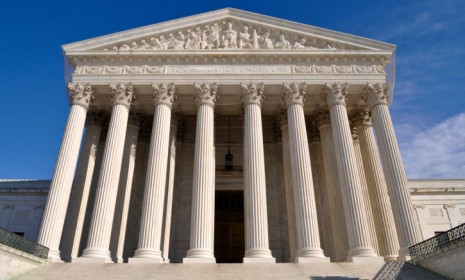What's next for gay marriage?
The Supreme Court chooses its cases


A free daily email with the biggest news stories of the day – and the best features from TheWeek.com
You are now subscribed
Your newsletter sign-up was successful
The U.S Supreme Court on Friday agreed to hear two gay marriage cases, including one in which federal benefits for a Massachusetts couple were denied under the Defense of Marriage Act, and another that overturned California's Proposition 8, which defined marriage as a union between a man and a woman.
The court said it will hear oral arguments in late March.
The case that has attracted the most attention from advocates and opponents alike is Windsor v. United States. The plaintiff, Edith Windsor, was required to pay a significant federal tax on the estate that she had inherited from her partner, who died in 2009. The federal government cited the 1996 Defense of Marriage Act, which prevents the federal government from recognizing gay marriage and forbids the provisioning of tax benefits and other inducements offered to married men and women.
The Week
Escape your echo chamber. Get the facts behind the news, plus analysis from multiple perspectives.

Sign up for The Week's Free Newsletters
From our morning news briefing to a weekly Good News Newsletter, get the best of The Week delivered directly to your inbox.
From our morning news briefing to a weekly Good News Newsletter, get the best of The Week delivered directly to your inbox.
In both cases, the court seems to be giving itself a lot of leeway; it accepted the petitions to hear the cases in a way that would allow it to rule either broadly, overturning or affirming the decisions on constitutional grounds, or narrowly, which would mean that the court's decisions would not significantly change the legal landscape for gay marriage.
Court watchers I've corresponded with believe that the likeliest outcome, given the justices' individual histories on similar questions, would be a decision that strikes down the federal recognition prong of DOMA while also ruling there is no constitutional right to get married. This result would mean that married gay couples would be eligible for federal benefits but that gays could only get married in states where such unions were legal.
In theory, a gay couple would be able to marry in a state that allowed gay marriage and then return to their home state, receiving federal benefits but no state recognition. It is difficult to predict because the court could do a lot of different things.
There is significant momentum in a number of states to legalize gay marriage by referendum or law; some gay rights advocates say that, as painful as it might be for gays living in states that won't legalize marriage for awhile, the state-by-state process confers significant legitimacy on their unions in a way that a court-imposed fiat might unleash backlash.
A free daily email with the biggest news stories of the day – and the best features from TheWeek.com
What can be said about how the court will rule is this: There is no way to build a majority coalition against gay rights in general because Justice Anthony Kennedy has become an impassioned advocate for gay rights; assuming he votes with the court's liberals, there are at least five reliable ideological supporters of the advance of gay rights. Chief Justice John Roberts is a cipher on the issue.
Arguing in favor of gay rights will be the U.S. Solicitor General, Don Verrilli.
Paul Clements, a solicitor general under President George W. Bush, will argue against them.
Marc Ambinder is TheWeek.com's editor-at-large. He is the author, with D.B. Grady, of The Command and Deep State: Inside the Government Secrecy Industry. Marc is also a contributing editor for The Atlantic and GQ. Formerly, he served as White House correspondent for National Journal, chief political consultant for CBS News, and politics editor at The Atlantic. Marc is a 2001 graduate of Harvard. He is married to Michael Park, a corporate strategy consultant, and lives in Los Angeles.
-
 Why is the Trump administration talking about ‘Western civilization’?
Why is the Trump administration talking about ‘Western civilization’?Talking Points Rubio says Europe, US bonded by religion and ancestry
-
 Quentin Deranque: a student’s death energizes the French far right
Quentin Deranque: a student’s death energizes the French far rightIN THE SPOTLIGHT Reactions to the violent killing of an ultraconservative activist offer a glimpse at the culture wars roiling France ahead of next year’s elections.
-
 Secured vs. unsecured loans: how do they differ and which is better?
Secured vs. unsecured loans: how do they differ and which is better?the explainer They are distinguished by the level of risk and the inclusion of collateral
